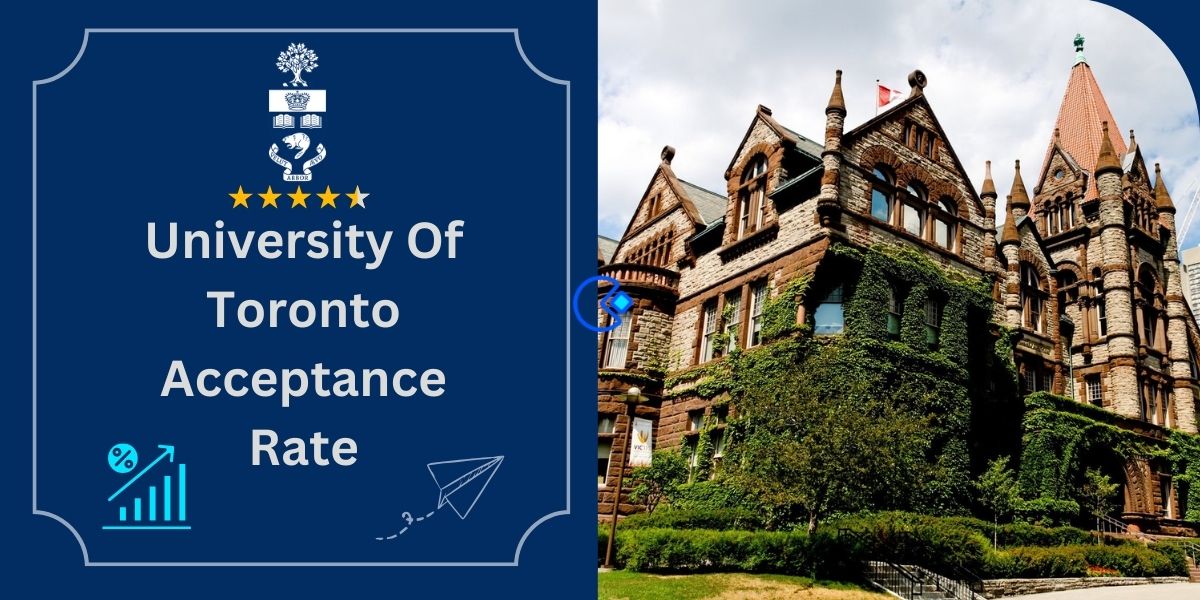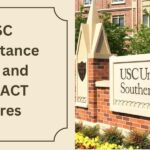Getting into the University of Toronto (U of T) is not so difficult. To be accepted into U of T, prospective students are advised to meet the school requirements and learn about the University of Toronto acceptance rate.
The University of Toronto is one of the best-required universities in the world. Indeed, it is Canada’s leading institution for learning, discovering, and creating knowledge.
However, compared to other universities with a similar reputation worldwide, the University of Toronto’s acceptance rate is quite high.
Therefore, to increase your chances of getting admitted, this article will explain how the University of Toronto Acceptance Rate works and how they accept in-state and out-of-state students as well as international students.
Also, you will get vital information on the admission criteria and student life at the University of Toronto.
About the University Of Toronto
The University of Toronto is a leading public research university in Toronto, Canada. It has constantly evolved as Canada’s leading institution due to its high standards in academics, teaching, and research.
The University of Toronto was established in 1827 with its main campus at St. George, Downtown Toronto, Ontario. The university currently imparts world-class education at three different locations in Canada, with a total enrolment of 91,286.
Read Also: How Can I Get An Online Agriculture Degree? Schools, Cost, Certifications
Over the years, the University of Toronto has become one of the most renowned and prestigious universities across the globe, ranking 25th in the QS World University Rankings.
The university offers over 700 undergraduate and 200 graduate programs and a doctorate in social science, humanities, engineering, arts, music, commerce, accounting, archaeology, etc. You can find more information here.
Reasons you should attend the University of Toronto
The University of Toronto is among the top leading public research universities in Toronto, Canada. It has a large number of applicants and an average acceptance rate of just 43%, which makes it very competitive.
- Reputation: The University of Toronto has consistently been ranked one of the best universities in the world at number 21 on the world rankings, specifically for its research and innovation. U of T attracts the best and brightest from around the world
- Counting over 120,000 international students each year, anywhere in Canada, you will be surrounded by a large multicultural environment, both in classrooms as well as in society. This creates a great advantage for any foreigner, meaning that you can easily adapt and make friends.
- Canada is one of the safest countries in the world, with a low crime rate. In terms of social progress and development, according to Global News, Canada was ranked the second country in the world with the highest quality of life.
- The University of Toronto is well known for its high level of academic performance and has competed globally with other top-ranking universities around the world.
- Among most Canadian universities, Toronto University has a longstanding reputation for producing five Canadian prime ministers and ten Nobel Prize winners among its former students.
- Networking: The University of Toronto opens up so many doors to a wide range of opportunities. Many of the alumni from U of T are well-established and are always looking to give back to their fellow students.
- The university has also been ranked by publications that evaluate the employment prospects of its graduates. Based on global employability, the University of Toronto ranked 14th in the world and 6th among North American public universities.
University of Toronto acceptance rate?
The University of Toronto’s acceptance rate is 43%.
This is primarily because the university accepts many domestic as well as international students, thus making the application process more competitive.
Read also: 14 Best Business Schools in Canada
Every year, the University of Toronto admits about 90,000 students, irrespective of how competitive the admission process may be, which includes both domestic and international students.
With 91,286 students admitted to the 3 campuses of the University of Toronto, here is a tabular representation of the school’s previous student enrollment (Fall 2018–19):
| St. George | Mississauga | Scarborough | Domestic | International | Total Enrolment | |
| Graduate | 18,219 | 781 | 356 | 15,829 | 3,527 | 19,356 |
| Undergraduate | 43,471 | 14,765 | 13,694 | 54,527 | 17,403 | 71,930 |
| Total | 61,690 | 15,546 | 14,050 | 70,356 | 20,930 |
Read also: Ivy League Medical Schools and Ranking
What is the U of T ranking?
The University of Toronto ranked #26 in the QS Global World University Ranking in 2020 and is now ranking #21 (2024).
Also from the QS ranking, U of T is #1 in the Canadian university ranking, #3 in the subject ranking, and #16 in the graduate employability ranking.
Other International Rankings:
- Times Higher Education (WUR): 18
- Shanghai Ranking (ARWU): 24
- National Taiwan University Ranking: 4
- U.S. News & World Report: 18
What GPA do you need to get into Toronto University?
- The average GPA required to get into Toronto University is 3.6.
- As per the recent admission cycle, a minimum GPA of 3.8 is considered competitive for graduate applicants.
- All your academic grades are included in a single GPA
You may need to calculate your 4.0 or 5.0 GPA scale using the most accurate calculators.
What is a good SAT, ACT, and English score for Toronto University?
- The average SAT score at Toronto University is 1600.
- High SAT scores can greatly improve students’ chances of acceptance.
- The average ACT score at Toronto University is 29.
- To apply to Toronto University, you will be required to submit a TOEFL iBT or IELTS academic test score.
- This test score varies according to the minimum English requirement of a particular faculty.
What are the U of T admission requirements?
known that the University of Toronto’s acceptance rate is 43%, making admission into the college very competitive.
Decisions on acceptances are made according to academic record, the number of spaces available, the distribution of subjects taken, and performance in courses relevant to the subject area.
So, the admission averages are calculated based on your six best grade 12U/M high school courses (including English).
These are also based on the Ontario High School curriculum. The minimum grade ranges for admission vary from year to year, depending on the applicant pool.
Admissions are based on academic background, regardless of the candidate’s age.
In general university admission requirements, present specific subject prerequisites as well as submitting a personal profile or statement of interest.
Typically, the application process may vary for local and international students. However, there are specific documents prospective students must submit while applying.
Below are some of the general U of T admission requirements:
- Supplementary Application Form (SAF)
- Transcript of High School records
- Essay
- Statement of Interest
- English proficiency test scores
- Two letters of recommendation
Subject Prerequisites
Prerequisites
Typically, prerequisites vary depending on the program you are applying to. Most of these prerequisites are based on the Ontario high school curriculum.
Therefore, remember to research your country’s educational system and course equivalents for these requirements before applying.
Here are some general guidelines on subject prerequisites. For programs in the Sciences, prerequisites may include all or some of
- Calculus and Vectors
- Advanced Functions
- Chemistry
- Biology
- Physics
For programs in management, prerequisites may include all or some of:
- Calculus and Vectors
- Advanced Functions
English Language Requirements
To determine whether or not you need to provide proof of the English language, you should have two questions in mind.
- What is your first language?
- How many years have you studied in an English-language school system in a country where the dominant language is English?
If your first language is not English and you have less than four years of satisfactory full-time study in an English language school system, then you must present proof of English proficiency.
- The minimum score accepted for IELTS is 6.5.
- The total accepted score for TOEFL is 100+22 for writing.
- For both the Cambridge Assessment C1 (advanced) and C2 (proficiency) tests, the minimum overall score is 180.
For detailed information on the English language requirements, click on the link below:
U of T admission requirements for Canadian students
As a Canadian high school graduate, conditional offers of admission will be made based on all of your Grade 11 finals and any available Grade 12 finals or midterms (in progress), with an emphasis on courses specific to the program to which you have applied.
Read also: USC Acceptance Rate, SAT/ACT scores, and GPA
What are the University of Toronto’s requirements for international students?
With international students from 157 countries and regions, the University of Toronto’s requirements for international students from various educational backgrounds include:
- Completed application form
- Payment of a non-refundable application fee of 180 CAD
- All academic transcripts from high school or senior secondary levels
- Completed senior-level or grade 12-level course
- English Language Requirements: TOEFL, IELTS, Cambridge C1 or C2, CAEL, etc.
- Self-reported grades form
- Standardized test scores
U of T Admission Requirements for Transfer Students
For prospective students that have completed some post-secondary studies and are interested in transferring to the University of Toronto’s Faculty of Arts & Science, admission consideration will be based on a combination of
- Completed application form
- Payment of a non-refundable application fee of 180 CAD
- All academic transcripts from high school or senior secondary levels
- Completed senior-level or grade 12-level course
- English Language Requirements: TOEFL, IELTS, Cambridge C1 or C2, CAEL, etc.
- Self-reported grades form
- Standardized test scores
Admission decisions are normally based on final post-secondary transcripts for the current academic year; however, students may be eligible for a provisional offer of admission based on a strong and consistent academic record(s).
Successful applicants will be admitted to a general honors bachelor of arts (HBA) or an honors bachelor of science (HBSc).
Once admitted to the Faculty of Arts & Science, enrollment in a program of study will depend on whether they meet the program requirements through a transfer credit assessment.
Select from the list below to see the specific admissions process that applies to you
Transferring from another university
- Competitive applicants to the Faculty of Arts & Science, University of Toronto St. George, and University of Toronto Mississauga usually have a solid ‘B’ average.
- Program prerequisites must be met at either the senior high school or university level.
- Transfer credits are assessed after admission has been decided. Credits are considered for degree courses taken at recognized degree-granting institutions. More information will be provided at the time of admission.
- If you have already completed an undergraduate degree at another post-secondary institution, you will be considered for a second degree.
- If you wish to take courses to qualify for a graduate program or other professional programs, you may want to consider applying as a non-degree applicant.
- Computer Science: Due to the program’s limited capacity, Computer Science will not be considering applicants seeking to transfer from other post-secondary institutions, U of T faculties, or U of T campuses other than the Faculty of Arts & Science, St. George Campus. For details, see the Applying to Computer Science section below.
- Rotman Commerce: Due to the program’s limited capacity, Rotman Commerce will not be considering applicants seeking to transfer from other post-secondary institutions, U of T faculties, or U of T campuses other than the Faculty of Arts & Science on the St. George Campus.
Transferring from a Canadian college
- Competitive applicants to the Faculty of Arts & Science, University of Toronto St. George, and University of Toronto Mississauga usually have a solid ‘B’ average.
- Program prerequisites must be met at the senior high school level. Two full college-level semesters of an academic subject may be considered to satisfy a prerequisite.
- If you have completed a two-year academic diploma, you may be eligible for a maximum of 3.0 unspecified transfer credits towards an Honors Bachelor of Arts (HBA) or an Honors Bachelor of Science (HBSc).
- If you have completed a three-year academic diploma, you may be eligible for a maximum of 5.0 transfer credits towards an Honors Bachelor of Arts (HBA) or an Honors Bachelor of Science (HBSc).
- Computer Science: Due to the program’s limited capacity, Computer Science will not be considering applicants seeking to transfer from other post-secondary institutions, U of T faculties, or U of T campuses other than the Faculty of Arts & Science, St. George Campus. For details, see the Applying to Computer Science section below.
- Rotman Commerce: Due to the program’s limited capacity, Rotman Commerce will not be considering applicants seeking to transfer from other post-secondary institutions, U of T faculties, or U of T campuses other than the Faculty of Arts & Science on the St. George Campus.
From another U of T Faculty or campus
You are an internal student if you previously registered at the University of Toronto in a degree, diploma, certificate, or pre-university program, or as either a non-degree or visiting student.
- Admission consideration is based on your CGPA and most recent annual GPA.
- Program prerequisites must be met at either the senior high school or university level. Applicants to limited enrollment programs must present the required first-year university courses.
- If you are currently pursuing a degree at the University of Toronto Mississauga (UTM), the University of Toronto Scarborough (UTSC), or the John H. Daniels Faculty of Architecture, Landscape, and Design (Daniels), all of your courses and grades from your studies at your previous division will be retained toward your Faculty of Arts & Science academic record.
- Final marks for any failed courses will also be incorporated into your Faculty of Arts and Science academic record.
- Computer Science: Due to the program’s limited capacity, Computer Science will not be considering applicants seeking to transfer from other post-secondary institutions, U of T faculties, or U of T campuses other than the Faculty of Arts & Science, St. George Campus. For details, see the Applying to Computer Science section below.
- Rotman Commerce: Due to the program’s limited capacity, Rotman Commerce will not be considering applicants seeking to transfer from other post-secondary institutions, U of T faculties, or U of T campuses other than the Faculty of Arts & Science on the St. George Campus.
Transferring from Quebec CEGEP
- If you have more than 12 academic CEGEP-level courses, you are automatically considered a transfer student and are eligible for transfer credits.
- If you have completed a two-year DEC, you may receive up to 5.0 transfer credits towards an Honors Bachelor of Arts (HBA) or an Honors Bachelor of Science (HBSc).
- The Côte de Rendement (R score) will be used for admission and scholarship consideration
- To satisfy the English requirement, you must present two semesters of English/Anglais
- To satisfy a program prerequisite of Calculus, you must present Calculus 1
- Year 2 CEGEP students are not eligible for direct admission into Rotman Commerce programs. For details, see the Applying to Rotman Commerce section below.
You may need to calculate your weighted 5.0 GPA scale using the most accurate 5.0 GPA calculator.
The University of Toronto Admission Process
International students interested in applying to the University of Toronto should follow the admission process below.
- Complete the admissions application and also submit the required documents.
- Apply for a study permit and an entry visa once you receive an acceptance letter from the university.
- Students can obtain applications for these documents from a Canadian embassy or consulate before departing.
- In addition, students can also seek help from the Centre for International Experience to find relief while facing unexpected challenges during their stay in Canada.
Read also: 15 Best SUNY Schools
What are the University of Toronto tuition fees?
The University of Toronto tuition fees for undergraduate domestic students start at CA $6,780 ($8,603.92 including ancillary fees), depending on the program.
For international students, prices are inevitably higher, ranging from around $35,890 to $58,970, again depending on the program chosen.
For graduate-level studies, prices span a broad range, from CA$10,080 to as much as $46,270, depending on the program.
| Program | Domestic | International | ||
|---|---|---|---|---|
| Year 1 | Upper Year | Year 1 | Upper Year | |
| Computer Science | $6,100 | $11,420 | $53,290 | $58,970 |
| Management | $6,100 | $15,900 | $53,290 | $64,810 |
| All other programs | $6,100 | $6,100 | $53,290 | $55,950 |
University Of Toronto Campuses
At the University of Toronto, you’ll find a network of leading researchers and academic excellence. You can earn your University of Toronto degree at any of our three campuses, which span the Greater Toronto Area.
To the west, the University of Toronto Mississauga (UTM) combines advanced research with an intimate academic experience.
And to the east, the University of Toronto Scarborough (UTSC) leads community-engaged research, hands-on learning, and co-op programs both locally and internationally.
Conclusion
The University of Toronto’s St. George campus features diverse college communities within Toronto’s vibrant downtown core. Each campus offers a wealth of opportunities across multiple disciplines and fields.
Originally posted 2021-04-16 08:02:00.



 Jobi.ng
Jobi.ng



